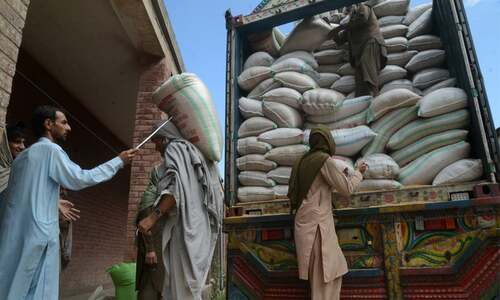THE plight of the second civilian government elected since the last military regime collapsed is evident to all students of politics but it is doubtful if it realises how much of its tribulation is due to its neglect of its party apparatus.
Mr Abid Hasan Minto, leading lawyer and head of Awami Workers’ Party, rightly regretted the other day the absence of political workers from the official drive against terrorism. Nobody can deny that the militants not only pose a military threat to Pakistan, they are also offering an ideological challenge. They cannot be defeated on either front without effective public mobilisation — something only organised party workers can achieve.
The absence of party activists from the political scene is not a recent phenomenon. Apart from a couple of minor outfits and quasi-religious militant organisations the so-called mainstream parties hardly qualify as thoroughly organised and functional political parties. The cost being paid by the country for this fundamental deficiency in the polity is absolutely unaffordable.
During the struggle against the colonial masters, the people of the subcontinent made considerable progress towards developing the art of speaking and acting through organised political parties. The All-India Congress did evolve a party system to gain the confidence of the people, of at least the classes it represented. The Muslim League too followed suit despite the Muslims’ love of cult figures and the aura of awe and reverence surrounding the Quaid.
Governments that ignore their party base insulate themselves against the public.
Both parties observed the ritual of electing their leaders, used annual congregations for making definitive statements and generally avoided taking major decisions without the sanction of their working committees. The smaller political parties were perhaps even more efficient organisations and had more disciplined cadres.
Over the years of freedom, political parties have lost their lustre in both India and Pakistan but it is in this country that the fall of political parties has been more ignominious and costlier.
When the Pakistan Muslim League was created in December 1947, the objective was to meet the new country’s need for a responsible political organisation to guide it and to keep an eye on its government. The Pakistan Muslim League accepted this role and for some months its president really considered himself entitled to call the government to account. The arrangement did not work. The government organised a stone-throwing party outside the League president’s house and he resigned. The prime minister became ex-officio president of the party. The Muslim League has remained a bonded maid in the PM house ever since.
Unfortunately, not only the various offspring of the Muslim League but other parties also got infected with the disease of subservience to authority, and even the Election Commission has failed to compel them to observe the first condition for a political organisation, namely, the holding of party elections on a regular basis.
The inevitable consequence of the downgrading of political parties has been governments’ increasing reliance on the state apparatus. The state apparatus betrayed Nazimuddin and he fell and also lost the plumage of Muslim League’s presidentship. Then the state apparatus played a game of musical chairs for five years and finally banished democracy in 1958.
Some latter-day examples of the havoc caused by the state establishment are worth recalling. Zulfikar Ali Bhutto rose to power on the crest of a movement generated by party followers. Soon afterwards, he started relying more on state apparatus than the party machine and realised the mistake only when the party workers had retired and the establishment had completed the script for his ouster.
During the 1988-98 decade, four governments fell under the axe of Article 58(2)b or under the command of the COAS, and the politicians heading them could do little because they had no party cadres to fight for them. In 1999, Nawaz Sharif tried to beat the state apparatus with a faction from its own ranks and the tactic boomeranged. The recent dharna agitation also revealed the ruling party’s lack of active and disciplined cadres. The isolated attempts to organise processions in its support only embarrassed saner political elements.
Lack of security is not the only disadvantage of managing a democratic structure without organised political parties. Governments that ignore their party base insulate themselves against the public. They lose the benefit of people’s collective wisdom while planning their agenda and also fail to notice their mistakes which are pretty obvious to citizens outside the circle of sycophants and hangers-on. Such governments exclude citizens from their rightful place in governance and ultimately alienate them to a dangerous extent.
The most important lesson of the present phase in Pakistan’s history is that people’s sovereignty does not mean only winning elections, completing the appointed term in assembly or government, and transfer of power from one elected government to another. It demands, in addition to all these things, properly structured, democratic parties and their dynamic cadres, as liberty, democracy and justice demand constant vigilance.
Pakistan is said to be fighting for its survival. The people want to know what this fight is about. What is at stake — the state, the government, the faith, the economy, a labourer’s job, a widow’s maintenance? The people are capable of rising to the occasion, but they depend, as always, on activists who can span the vast gap between them and their rulers.
Perhaps there is still time for the mainstream parties to look at themselves through ordinary citizens’ eyes and repent and reform. What Pakistan today needs more than bombs and bullets is row after row of young, informed, well-groomed and dedicated activists in properly organised political parties. If there is no hope of awakening among the fossilised leaderships on the front benches let their young followers start calling the shots or throw up new parties that would do justice to their noble calling.
Published in Dawn January 8th , 2014
On a mobile phone? Get the Dawn Mobile App: Apple Store | Google Play











































